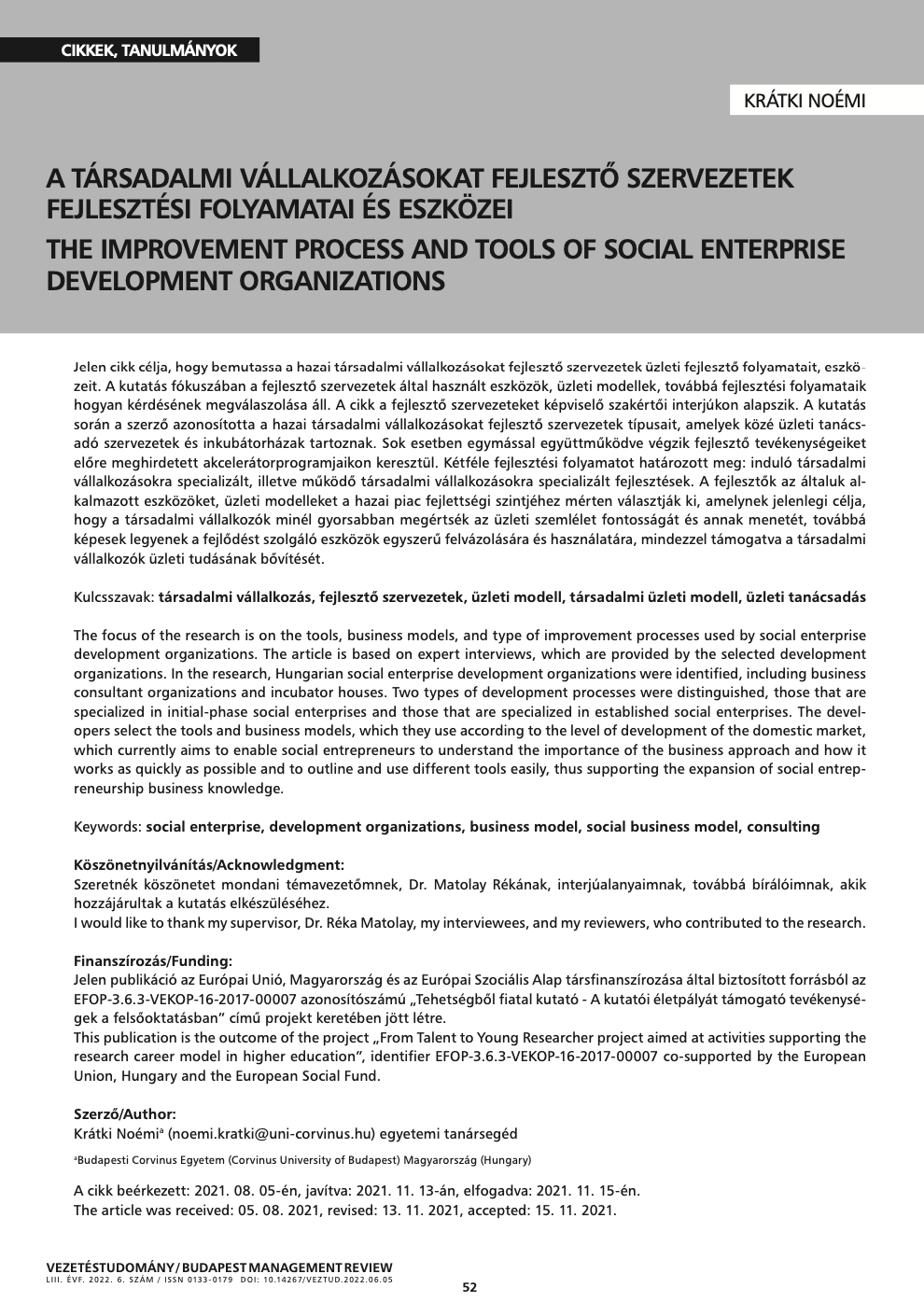A társadalmi vállalkozásokat fejlesztő szervezetek fejlesztési folyamatai és eszközei
DOI:
https://doi.org/10.14267/VEZTUD.2022.06.05Keywords:
social enterprise, development organizations, business model, social business model, consultingAbstract
The focus of the research is on the tools, business models, and type of improvement processes used by social enterprise development organizations. The article is based on expert interviews, which are provided by the selected development organizations. In the research, Hungarian social enterprise development organizations were identified, including business consultant organizations and incubator houses. Two types of development processes were distinguished, those that are specialized in initial-phase social enterprises and those that are specialized in established social enterprises. The developers select the tools and business models, which they use according to the level of development of the domestic market, which currently aims to enable social entrepreneurs to understand the importance of the business approach and how it works as quickly as possible and to outline and use different tools easily, thus supporting the expansion of social entrepreneurship business knowledge.
Downloads
References
Amin, A. (2009). Locating the social economy. In Ash A. (ed.), The social economy. International perspectives on economic solidarity (pp.4-21). London, New York: Zed Books
Ashoka Honlapja. (n.a.). Impact Academy Magyarország. Retrieved from https://www.ashoka.org/hu-hu/program/impact-academy
Beckmann, T. (2015). A Theoretical Evaluation of Social Enterprise. SSRN Electronic Journal. https://doi.org/10.2139/ssrn.2711172
Erste Bank Press Release. (2016). Erste SEEDS Programme Supports nearly Seventy Social Entrepreneurs in Hungary.
Fejes, J. (2015). A tudásmenedzsment fejlődési szakaszainak tettenérése a magyar üzleti tanácsadás piacán. Vezetéstudomány, 46(8), 24-33. https://doi.org/10.14267/VEZTUD.2015.08.03
G. Fekete, É., Bereczk, Á., Kádárné Horváth, Á., Kiss, J., Péter, Zs., Siposné Nándori, E.. & Szegedi, K. (2017). Alapkutatás a társadalmi vállalkozások működéséről.
Gidron, B. (2016). The Dual Hybridity of Social Enterprises for Marginalized Populations. Journal of Social Entrepreneurship, 8(1), 1-13. https://doi.org/10.1080/19420676.2016.1207700
Keltető+ Program Pályázati Felhívás. (2019). Retrieved from https://www.badurfoundation.org/images/badur/reports/Badur_Kelteto+_2019_Felhivas.pdf
Kiss, J. & Mihály, M. (2019). Társadalmi vállalkozások és ökoszisztémáik Európában. Magyar országjelentés. Luxembourg: Publications Office of the European Union. https://doi.org/10.2767/668169OFA
Kiss, J. & Mihály, M. (2020). A szociális és szolidáris gazdaság intézményi fejlődése és jelenlegi helyzete Magyarországon. Fordulat, 27(1), 299-324.
Krátki, N. & Kiss, J. (2021). Szociális és egészségügyi területeken működő társadalmi vállalkozások üzleti működési modelljei. Vezetéstudomány, 52(1), 2-12. https://doi.org/10.14267/VEZTUD.2021.01.01
Lovas, A. & Riz, N. (2016). Akcelerátor vagy inkubátor? A hazai vállalkozásokat támogató szervezetek a nemzetközi gyakorlat tükrében. Gazdaság és Pénzügy, 3(4), 305-322.
Mihály, M. (2017). Mit értünk társadalmi vállalkozás alatt és miért kutatjuk? – Narratívák a nemzetközi szakirodalomból. Észak-magyarországi Stratégiai Füzetek, 14(1), 101-115.
Nchang, O. & Rudnik, T. (2018). Incubator and Accelerator Role in the Social Entrepreneursip Process.
Németh, Gy., Németh, P. & Papp, I. (2010). Szolgáltatási menedzsment. Budapest: Akadémiai Kiadó.
Osterwalder, A. & Pigneur, Y. (2010). Business Model Generation: A Handbook for Visionaries, Game Changers, and Challengers. Hoboken: John Wiley & Sons, Inc.
Patton, M. Q. (1990). Qualitative evaluation and research methods. Thousand Oaks: Sage.
Peredo, A.M. & McLean, M. (2006). Social entrepreneurship: A critical review of the concept. Journal of World Business, 41, 56-65. https://doi.org/10.1016/j.jwb.2005.10.007
Piac Társ GINOP-5.1.2-15-2016-00001Fejlesztző Projekt Tanulmánya. (2017). Módszertani kézikönyv társadalmi vállalkozások részére.
Poór, J. (2010). Menedzsment-tanácsadási kézikönyv. Budapest: Akadémia Kiadó.
Primecz, H., Kiss, J. & Toarniczky, A. (2021). Társadalmi és üzleti célok és tevékenységek kombinálása magyarországi társadalmi vállalkozásoknál. Fókuszban a romákat, a nőket, és a fogyatékossággal élő embereket támogató szervezetek. Kovász, 25(1-4), 1-26. https://doi.org/10.14267/kov.2021e2
Repsiky, M. & Tóth, J. (2019). Mi motivál egy társadalmi vállalkozót? – Egy feltáró kvalitatív kutatás eredményei. Vezetéstudomány, 50(3), 11-24. https://doi.org/10.14267/VEZTUD.2019.03.02
Rogers, P. (2014). Theory of Change, Methodological Briefs: Impact Evaluation 2. Florence: UNICEF Office of Research.
Sandberg, B., Elliott, E. & Petchel, S. (2020). Investigating the Marketization of the Non-profit Sector: A Comparative Case Study of Two Non-profit Organizations. Voluntas, 31(4), 494–510. https://doi.org/10.1007/s11266-019-00159-8
Serrat, O. (2017). Knowledge Solutions. Singapore: Springer. https://doi.org/10.1007/978-981-10-0983-9_24
Social Innovation Lab. (2013). Social Business Model Canvas.
Szegedi, K. & Bereczk, Á. (2017). A társadalmi vállalkozások finanszírozási lehetőségei, jogi szervezeti formái és beágyazódása a szociális gazdaság rendszerébe. In Csiszárik-Kocsir Á. (Ed.), Vállalkozásfejlesztés a XXI. században (pp. 602-617). Budapest: Óbudai Egyetem.
Tokár-Szadai, Á. (2012). Az üzleti tanácsadási rendszer modellje. Vezetéstudomány, 43(1.ksz), 66-73. https://doi.org/10.14267/VEZTUD.2012.ksz1.07
Tokár-Szadai, Á. (2015). A társadalmi vállalkozások tanácsadás iránti igényei. Észak-magyarországi Stratégiai Füzetek, 12(2), 1-58.
Tokár-Szadai, Á. (2021). Társadalmi vállalkozások tanácsadási igényének változása Északkelet-Magyarországon 2015 és 2020 között. Észak-magyarországi Stratégiai Füzetek, 18(1), 98-109. https://doi.org/10.32976/stratfuz.2021.24

Downloads
Published
How to Cite
Issue
Section
License
Copyright (c) 2022 Vezetéstudomány / Budapest Management Review

This work is licensed under a Creative Commons Attribution 4.0 International License.
Authors assign copyright to Vezetéstudomány / Budapest Management Review. Authors are responsible for permission to reproduce copyright material from other sources.

